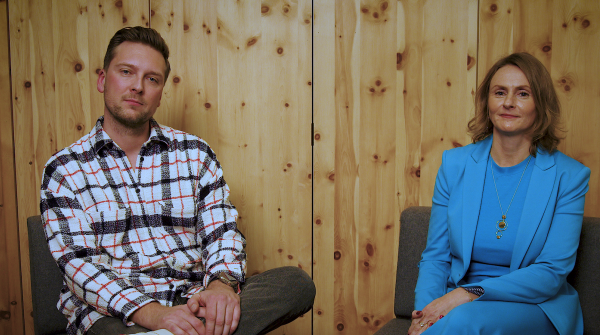We have summarized the tips of ISPO Brandnew winners and successful start-ups Ryzon, Heatit, Clim8 and Covision MediaLab into seven learnings for healthy growth for start-ups:
"Scaling a startup in a healthy way requires the right stakeholders and partners," says Christian Langer, Advisory Board Member and advisor to many young companies in the sports industry. He cites four areas where relationships are particularly important:
- committed employees,
- competent investors,
- supportive business partners
- and, last but not least, enthusiastic customers.
If things are not right in one of these areas, "it gets difficult," says Langer. A good example for him are impatient investors who are only focused on fast growth. That does more harm than good, he says. Experienced investors will focus on healthy growth. The same applies to partners in new regions, for example. Here, it's better to look twice, he says. "Values and strategic goals must match." Clear and precise agreements are fundamental here, "otherwise dissent is pre-programmed," says Langer, referring to his many years of experience.

Looking inward, startups should ask themselves early on what their core values are. At the French company clim8 these are Innovation, team efficiency, transparency and success. "For every project, we question whether we can adhere to these values," says co-founder Florian Miguet. Today, employees are also selected according to them: "Today, a former mistake has turned into a real strength of our brand. In the first two years, we hired employees based on their skills and not their values; today it's the other way around.
ISPO Brandnew Winners have learned to say "no." "We prioritize with the team in mind," Miguet says. "Because some projects sound exciting, but they could roll over us and dilute our company core."
Directly related is workforce planning. Miguet: "We often waited too long before hiring new employees. As a result, we asked too much of ourselves." Many of the successful ISPO Brandnew companies, such as HeatIt, which grew directly out of university projects or right after graduation, have an advantage: they can hire interns or young (part-time) employees directly from their network in the surrounding area. But not everyone is in this fortunate position.
If the investment in the first full-time employees seems too high, you can use the trick of Mario Konrad, co-founder of Ryzon "I always thought of the salary in terms of the monthly salary." He then thought that the employee would work for four to five weeks, during which time he or she would add value that would certainly correspond to the equivalent value of the salary. And the salary is only paid out afterwards.
"We've always chosen our investors based on their strategic background, expertise and network - not the depth of their pockets," Miguet says. The company currently has a VC fund in sports tech, a 100-year-old industrial family from the textile industry and digital experts as investors. Lukas Liedtke, CEO of HeatIt, sees it quite the same way: "It is crucial to align expectations and then ensure that all parties benefit from the collaboration. That's the only way to successfully manage crises together."
For Franz Tschimben, co-founder of Covision Medialab, communication and openness are key: "It is very important to regularly communicate results, challenges and mistakes. Good partners - building on their many years of experience in company building and leadership - are always ready to give tips and open doors.
Parallel to the work on the product, contacts must be constantly established and maintained. Potential customer contacts are just as important as building a solid partner network. Franz Tschimben advises boldly going ahead, especially when approaching large companies: "The most important thing is to have a mindset according to the motto 'It costs nothing to ask' as well as a good go-to-market strategy." It's important to remember that you don't have to do everything on your own. His company Covision MediaLab uses four ways to make contacts.
- Warm Intros: friends in the same market, partner companies, investors, ex-colleagues* from a previous job, former fellow students
- Direct Outreach: Mainly LinkedIn and Twitter, two fantastic tools to build a network and sales channels.
- Events: Trade shows like ISPO Munich and industry-specific B2B events are not to be underestimated. The contacts you make there can be direct sales contacts or in turn increase your network and lead to "warm intros".
- Inbound Sales: A solid marketing strategy is a prerequisite for this, and certain minimum investments in SEO are necessary.
"We fail every day in technology developments as well as in building companies. That's part of our DNA," Tschimben says. "The most important thing is to quickly recognize when something doesn't work, learn from it iteratively, and then find the right way."
For the other founders, too, dealing with mistakes the right way is crucial. Konrad remembers costly learnings at Ryzon well: "Looking back, we offered too many products too quickly. We quickly had over 200 items. With one third of the collection, however, we made 70 % of the turnover, with the next third then another 25 %. With today's knowledge and against the background that we always had too little liquidity, these funds could have been invested much more sensibly in products that were running well."
Konrad and his team at Ryzon put this learning to good use: Now they offer a rather small collection in more colors. They are also investing in products specifically for women. Here lie two growth levers for the entrepreneur.
HeatIt founder Liedtke can now take mistakes with a sense of humor: "Unfortunately, there is not enough space here for the many failures we have made," he says. "Even the very first flyer we happily handed out for days at a trade show in 2018 was titled 'Use your smartphone to treat insect bites.' Obviously, we had forgotten 'to treat'. It caught the eye of my co-founder's mother after the trade show was through. And that was far from the last print product fail." His sympathetic recommendation is not to lose the fun in the work; that helps get over many crises, he says. "You have to see the whole thing as a great adventure, and if things don't go as planned, you've still learned an extreme amount."
From the very beginning, HeatIT had the vision to distribute its product for the heat treatment of insect bites worldwide. "After all, mosquitoes are not only, and perhaps not even specifically, a problem in Germany. We did extensive market research to analyze the potential in other regions," says Liedtke. However, he says, it was often not so much the strategy as the personal contacts or the enthusiastic users that led to successful partnerships.
This off-strategy strategy has worked: "In the U.S., we succeeded in entering the market after a long period of preparation, and we are proud that we were able to inspire REI Co-op, perhaps the best and largest outdoor retailer in the world, to sign up with HeatIT.
- Awards
- Mountain sports
- Bike
- Fitness
- Health
- ISPO Munich
- Running
- Brands
- Sustainability
- Olympia
- OutDoor
- Promotion
- Sports Business
- Textrends
- Triathlon
- Water sports
- Winter sports
- eSports
- SportsTech
- OutDoor by ISPO
- Heroes
- Transformation
- Sport Fashion
- Urban Culture
- Challenges of a CEO
- Trade fairs
- Sports
- Find the Balance
- Product reviews
- Newsletter Exclusive Area
- Magazine







